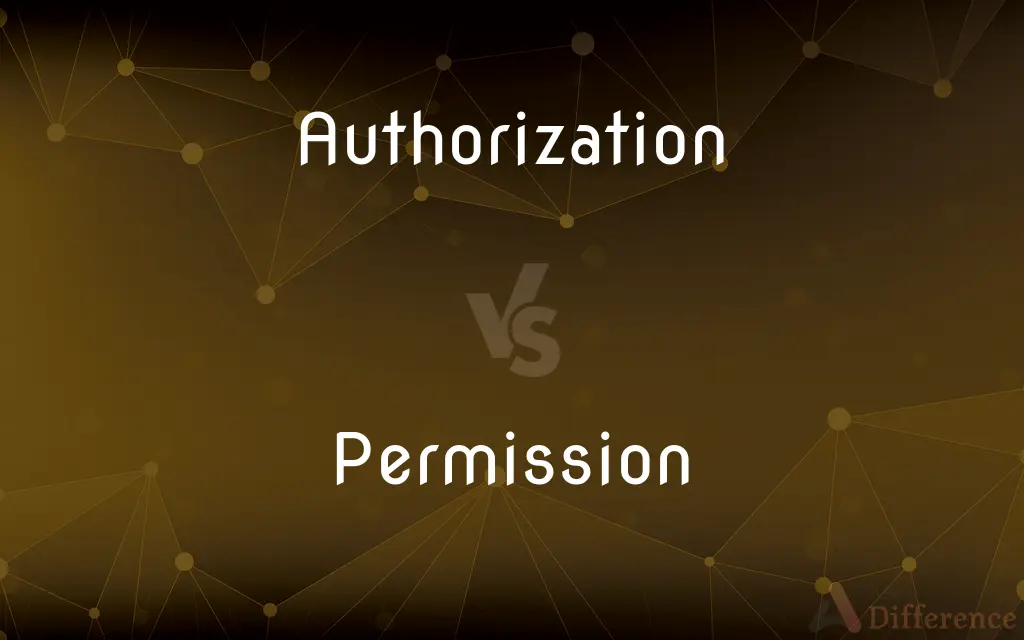Authorization vs. Permission — What's the Difference?
By Tayyaba Rehman — Updated on October 17, 2023
Authorization is formal approval, often for actions or services, while permission is consent, usually less formal. Both involve granting rights.

Difference Between Authorization and Permission
Table of Contents
ADVERTISEMENT
Key Differences
Authorization typically implies a formal granting of power or rights. It's often used in contexts where legal, official, or institutional approval is given for certain actions to be taken or services to be accessed. Permission, however, generally has a more casual or personal connotation, relating to the approval given by one individual to another. The subtleties between these terms lie in the level of formality and the contexts in which they're used.
In a professional setting, authorization often requires a documented process, necessitating the individual to fulfill specific requirements to obtain the necessary approval. This could include the authorization required to access certain data or systems. Permission, while also a form of approval, doesn't usually require a formal process or documentation. It's more so an agreement between parties, like when a friend gives another friend permission to borrow a car.
From a legal perspective, authorization is a term used when a body of authority — such as a government, institution, or corporation — grants rights to an individual or entity. This could pertain to the authorization of legal representation or medical procedures. Permission, in legal terms, might still involve the consent of one party to another, but it's often less formal and might not involve a governing body or a set of enforceable rules or laws.
In the realm of digital and information security, authorization refers to the rights and privileges assigned to an individual or entity allowing them access to systems or data. It's a security measure ensuring that individuals can only perform actions or access information permissible under their authorization level. Permission in this context might be considered a subset of authorization, often used interchangeably, but it still carries a less formal tone, more aligned with personal consent rather than system-enforced constraints.
Authorization and permission both play roles in everyday language, though with slightly different implications. When someone is authorized, there's an implication of a right or power being formally conferred. However, when someone is given permission, it suggests a more informal, personal consent — it's less about rights and more about consent in interpersonal relations.
ADVERTISEMENT
Comparison Chart
Formality
More formal, often documented
Less formal, often verbal
Context
Professional, legal, digital security
Personal, everyday situations
Granted by
Institutions, authorities
Individuals, casually
Implication
Confers rights or power
Indicates consent
Documentation
Often requires documentation
Rarely requires documentation
Compare with Definitions
Authorization
Authorization is a document or form that allows someone to do something.
Her authorization form was needed to process the transaction.
Permission
Permission is consent given by someone in authority.
They needed the teacher’s permission to use the lab after school.
Authorization
Authorization in technology means giving access rights to resources.
User authorization is critical for data security in any organization.
Permission
Permission in digital terms refers to the rights given to access or modify files.
Admin permission is required to install the software.
Authorization
Authorization can be a legal mechanism for one entity to act on another's behalf.
Through a letter of authorization, she was able to represent her company at the hearing.
Permission
Permission is the act of allowing someone to do something.
He asked for permission to leave early and it was granted.
Authorization
Authorization is the official approval to do something.
With the proper authorization, he accessed the company’s confidential files.
Permission
Permission means approval from an authority figure.
Without permission, they could not proceed with the filming.
Authorization
Authorization means having the authority to make decisions.
He had the authorization to approve large expenditures for the firm.
Permission
Permission can also mean legally authorizing use of one's property or work.
The artist gave permission for her music to be used in the commercial.
Authorization
Authorization is the function of specifying access rights/privileges to resources, which is related to general information security and computer security, and to access control in particular. More formally, "to authorize" is to define an access policy.
Permission
The action of officially allowing someone to do a particular thing; consent or authorization
They had entered the country without permission
He received permission to go to Brussels
Authorization
The act of authorizing.
Permission
The act of permitting, especially in giving formal consent; authorization
Do they have permission to leave?.
Authorization
Something that authorizes; a sanction.
Permission
An authorization to do something, as to quote from a book under copyright.
Authorization
(uncountable) Permission.
I've got authorization. Call the office and you'll see.
Permission
Authorisation; consent (especially formal consent from someone in authority)
Sire, do I have your permission to execute this traitor?
Authorization
(countable) An act of authorizing.
Permission
The act of permitting.
Authorization
(countable) (A document giving) formal sanction, permission or warrant.
Can I see your authorization?
Permission
(computing) Flags or access control lists pertaining to a file that dictate who can access it, and how.
I used the "chmod" command to change the file's permission.
Authorization
(government) Permission, possibly limited, to spend funds for a specific budgetary purpose.
We've had the authorization for years, but we've never gotten an appropriation.
Permission
(transitive) To grant or obtain authorization for.
Authorization
The act of giving authority or legal power; establishment by authority; sanction or warrant.
The authorization of laws.
A special authorization from the chief.
Permission
The act of permitting or allowing; formal consent; authorization; leave; license or liberty granted.
High permission of all-ruling Heaven.
You have given me your permission for this address.
Authorization
A document giving an official instruction or command
Permission
Approval to do something;
He asked permission to leave
Authorization
The power or right to give orders or make decisions;
He has the authority to issue warrants
Deputies are given authorization to make arrests
Permission
The act of giving a formal (usually written) authorization
Authorization
Official permission or approval;
Authority for the program was renewed several times
Authorization
The act of conferring legality or sanction or formal warrant
Common Curiosities
What constitutes valid authorization in a professional setting?
Valid authorization usually requires formal documentation or a digital security measure affirming an individual’s right to access or control resources.
Is verbal permission legally enforceable?
Verbal permission can be legally enforceable, though it's often harder to prove than written permission or authorization.
Can permission be implicit?
Yes, permission can be implicit, inferred from actions or circumstances, but explicit permission is clearer and legally safer.
Can authorization be revoked?
Yes, authorization can typically be revoked by the entity that granted it, depending on the terms initially set.
Why is authorization important in data security?
Authorization helps ensure that only approved individuals can access certain data, thereby protecting sensitive information and mitigating breaches.
Who generally provides authorization in a corporate context?
In corporations, authorization is usually given by higher management or specific departments like HR, IT, or Security, depending on the context.
What’s the difference between permission and consent?
Permission and consent are often used interchangeably, but consent generally refers to agreement in situations involving personal autonomy or data privacy.
How is permission granted in informal settings?
In informal settings, permission is often granted verbally or through informal communication like text messages or emails.
Share Your Discovery

Previous Comparison
Fusspot vs. Fussbudget
Next Comparison
Loosely vs. CasuallyAuthor Spotlight
Written by
Tayyaba RehmanTayyaba Rehman is a distinguished writer, currently serving as a primary contributor to askdifference.com. As a researcher in semantics and etymology, Tayyaba's passion for the complexity of languages and their distinctions has found a perfect home on the platform. Tayyaba delves into the intricacies of language, distinguishing between commonly confused words and phrases, thereby providing clarity for readers worldwide.















































